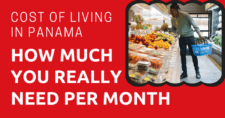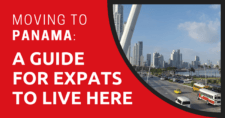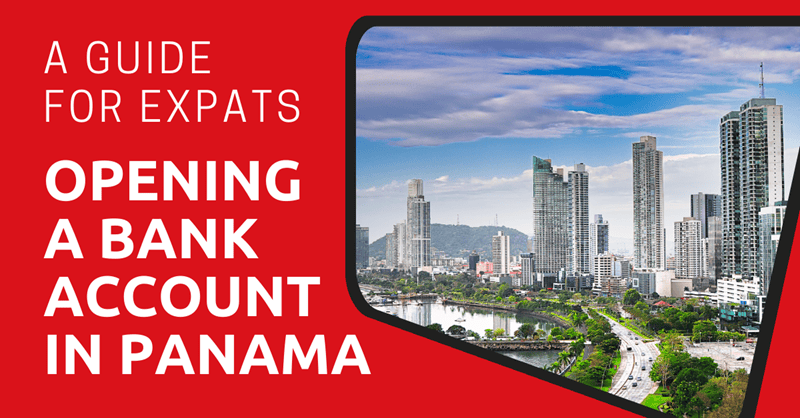
If you’re going to live in Panama, you need to have a local bank account.
There are plenty of options. The country is an offshore banking hub and has a well-developed financial sector. A mix of Panamanian and international banks offer services to expats.
In this article, I’m going to tell you everything you need to know to open a bank account in Panama. We will cover these topics:
- The reasons why you should have a local bank account;
- Requirements and necessary paperwork;
- How to choose a bank;
- The process of opening an account, step by step;
- Account options and fees;
- Legal and tax obligations;
- General banking tips.
This article will take approximately 17 minutes to read. Don't have the time right now? No worries. You can email the ad-free version of the article to yourself and read it later!
Disclaimer: This article may include links to products or services offered by ExpatDen’s partners, which give us commissions when you click on them. Although this may influence how they appear in the text, we only recommend solutions that we would use in your situation. Read more in our Advertising Disclosure.
Contents
- Is It Safe to Open a Bank Account in Panama?
- Why You Need a Local Bank Account
- Save Extra Changes on Everyday Purchases
- Requirements for Opening a Bank Account
- Choosing a Bank in Panama
- Types of Bank Accounts
- Step-by-Step Guide to Opening an Account
- Common Fees and Costs
- Legal and Tax Obligations
- Banking Tips for Expats in Panama
- Now, on to You
Is It Safe to Open a Bank Account in Panama?
You might feel nervous about storing your money in a foreign account, but you can rest assured that banks in Panama are trustworthy and safe.
Here are four reasons why expats from around the world have chosen to bank in Panama:
- It’s home to reputable banks that have excellent track records working with foreigners. Many provide services in English.
- Panama is committed to protecting the financial privacy of its residents. Local banks prioritize confidentiality and protect their clients’ information.
- The U.S. dollar is the official currency, which keeps the economy and banking environment stable.
- Panama has passed financial regulations that ensure the banking system runs smoothly. An organization called the Superintendency of Banks of Panama supervises banks and ensures they follow the rules. Financial institutions are held accountable for their actions.
Why You Need a Local Bank Account
There are many reasons you need to open a bank account in Panama after moving here.
Visa Application
First, you will be required to open a bank account in Panama to apply for residency.
Depending on which visa you have, you could be asked to deposit a certain amount into the account. This is to show the government that you have enough money to support yourself. For example, for my Friendly Nations visa, I had to deposit US$5,000 in a local bank.
Get Paid
If you plan to work for a Panamanian company, you will need a local bank account to get paid.
Transfer Money to Panama
You will be able to transfer money more easily to Panamanian accounts if you use a local bank. Wire transfers between international accounts are expensive and can take days to go through.
Paying Utilities
Having a bank account in Panama makes paying utilities and other services easier. Rent, electricity, internet, cable, and water bills can all be paid with an instant transfer from a local bank account. This is also true for recharging cell phone plans and public transportation passes. You won’t be able to pay for these services via direct deposit from a foreign bank.
Save Extra Changes on Everyday Purchases
Opening an account at a local bank saves you extra charges on everyday purchases.
If you use your foreign debit card to buy a product or withdraw cash, you’ll end up losing money to international transaction fees.
Requirements for Opening a Bank Account
Both residents and non-residents can open a bank account in Panama, but most local banks prefer to do business with clients who have legal residency (or have started the application process).
The country has strict anti-money laundering practices, and foreigners must provide paperwork that proves their funds are legal.
You will be asked for the following documents when setting up a local bank account:
- Your passport.
- A second ID, such as your driver’s license.
- Reference letter from another bank that includes the amount of time you’ve been a client and your account balance.
- Reference letter from your immigration lawyer.
- Proof of address in Panama: a lease agreement or recent utility bill with your name and residential address.
- Proof of income: pay stubs, bank statements, or a letter from your employer.
Local banks are more likely to accept you as a client if you can show proof of a personal or economic tie to Panama – to cover all bases, take a copy of your employment contract, residency card, or an immigration status document from the National Immigration Service.
All documents must be notarized and written in Spanish. If your papers are in English or another language, have them translated and signed by an official translator.
Your paperwork will expire after three months, so it’s a good idea to request documents from your home country a couple of weeks before you leave and to open your new account immediately upon your arrival in Panama.
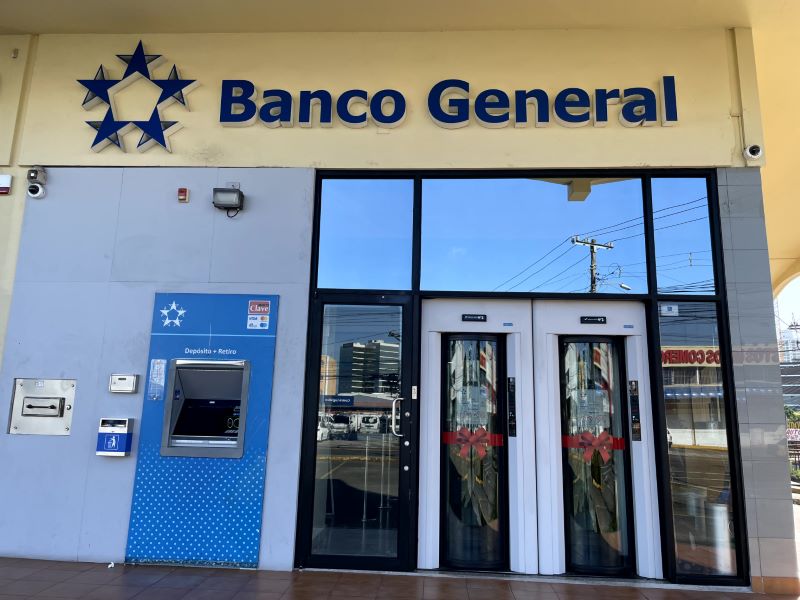
Some banks in Panama require a minimum deposit that can be anywhere from US$100 to US$1,000, or more. You can place this first deposit with cash or a wire transfer after you’ve opened the account.
Choosing a Bank in Panama
There are over 50 banks in Panama.
Two are controlled by the government – Banco Nacional and Caja de Ahorros – and the others are private. The private sector is divided into domestic and international banks.
Consider these points when looking for a local bank:
- Location: Banking options are limited outside Panama City. If you’re going to live in another part of the country, you have two options. You can either choose a bank that has branches and ATMs throughout the country, or travel to the capital – where the international banks are based – whenever you need in-person services.
- Availability of English-speaking staff: Many international banks in Panama offer services in English. If you don’t speak Spanish, you should avoid domestic banks as the availability of English-speaking customer service is hit-and-miss. Instead, go with an international bank that has experience working with English speakers.
- Online banking services: Most banks in Panama have websites where you can do everyday banking from anywhere in the country. Before choosing a bank, visit its website to make sure it’s easy to use and that it offers the services you need. This is especially important if you’ll be living far from a branch.
Here is a list of the banks that expats most commonly use in Panama:
Banco General
The most popular and convenient bank is Banco General.
This private Panamanian bank has branches in every Panama City neighborhood and many locations throughout the country, even in small towns. There are Banco General ATMs in pharmacies, supermarkets, metro stations, and on nearly every street corner.

Banco General accounts come with an instant payment app called Yappy, which you can use to pay in stores, taxis, street vendors, pharmacies, and more.
The requirements for opening an account with Banco General are strict, and you must show a strong economic tie to Panama – typically residency or an employment contract.
Banco General requires a minimum opening deposit of US$50 for savings accounts.
Banistmo
Banistmo is one of the largest banks in Panama and is part of the Bancolombia Group. It has a strong presence throughout the country, with branches and ATMs in all provinces. Banistmo offers 24/7 customer service through a chat feature in its mobile banking site.

In terms of accessibility and availability, Banistmo is a close second to Banco General.
I have a Banistmo savings account that I opened a week after moving to Panama. Banco General was my first option, but they turned me down because I wasn’t a resident yet – I had barely started my visa application process.
Fortunately, Banistmo accepted a letter from my lawyer that explained my immigration status.
If you’re new to Panama, it’s usually easier to open an account with Banistmo than with Banco General.
The minimum opening deposit for Banistmo savings accounts is US$500 for foreigners.
Scotiabank Panama
Scotiabank Panama is a major Canadian bank with its regional headquarters in Panama City. With solid customer service and English-speaking staff, Scotiabank is an excellent choice for expats living in the capital.
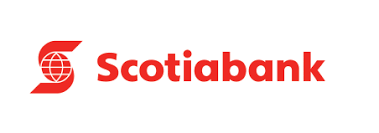
While there are several Scotiabank branches and ATMs in Panama City, you won’t find this bank anywhere else in the country. Fortunately, it offers a great mobile banking platform, but you’ll need to be prepared for a trip to the city whenever you want to visit a branch.
To open a savings account with Scotiabank Panama, you’ll need to make an initial deposit of US$100.
BAC Credomatic
BAC Credomatic is based in Central America and the Caribbean. Its headquarters are in San José, Costa Rica.
This banking group offers many financial services, including banking, credit cards, and loans to citizens and foreign residents. Expats often find it easier to be approved for a credit card at BAC than at Banco General or Banistmo because the requirements are less strict.

There are BAC branches and ATMs in Panama City and in other large towns like Chitré, Penonomé, Colón, David, Santiago, and Las Tablas. Most popular expat destinations are within a two-hour drive of one of these cities.
BAC Panama asks for a minimum opening deposit of US$50 for savings accounts.
Global Bank
Global Bank has experience serving both Panamanian and international clients. An English version of their website is available, and the bank is known for its friendly customer service. With many account options, Global Bank is prepared to meet the financial needs of expats.

Global Bank has a large network with many branches in Panama City and throughout the country. It has more locations outside the capital city than any other bank on this list, except Banco General and Banistmo.
The minimum opening deposit is US$50 for a Global Bank savings account.
Multibank
Multibank has a good reputation in the local banking industry and is known for customer satisfaction. This Panamanian bank is a good choice for expats because of its wide range of services, such as banking, credit cards, loans, investments, and insurance. If you’re looking for business or auto insurance, Multibank has reliable plans.

Multibank has a growing network of branches and ATMs around the country.
Panama City is home to several branches, and the main city of each province has a Multibank office.
Be prepared to make a first deposit of at least US$50 to open a Multibank savings account.
Types of Bank Accounts
Banks in Panama offer the kinds of accounts that are important to expats. Account options at domestic and international banks include:
- Savings accounts
- Checking accounts
- Credit card accounts
- Multi-currency accounts, which are useful for expats who deal with two or more currencies.
- Investment accounts
- Certificate of Deposit (CD), a fixed-term savings account with high interest rates.
Savings and checking accounts are the most common choices for expats who plan to use their account to pay everyday expenses in Panama.
Account types vary by bank, so contact the one you’re interested in or visit its website to ensure it has the services you need.
Step-by-Step Guide to Opening an Account
These are the steps you need to follow to open a bank account in Panama:
Choose a Bank
To find a bank that aligns with your needs, ask other expats and your lawyer for recommendations.
Gather Application Documents
Collect the paperwork I listed above and ensure it’s properly translated and notarized. It’s best to have copies of each document, just in case.
Meet with a Bank Representative
Foreigners are required to apply for a bank account in person. You can schedule an appointment, but it’s also okay to just walk into a branch. A banker will review your documents and help you decide what kind of account is right for you.
Fill Out Application Forms
The representative will guide you through the application form for the account.
Complete the Verification Process
The bank will check your documents and may ask you a few questions about your finances.
Pay the Initial Deposit
You will need to deposit an amount that varies by bank to activate your account.
Receive Account Details
Once your account is approved, the bank will give you your account number and other important information. You will also receive your debit card, which is usually given immediately after account activation. Your bank representative will show you how to set up the card and PIN.
Common Fees and Costs
Bank accounts in Panama charge several fees. These costs vary depending on the bank and account type, but the typical fees are the following:
- Initial debit card fee: This is the price paid for a debit card when you open a savings or checking account. At Banco General, the debit card fee is US$25.
- Fraud protection: Signing up for fraud protection is optional, but this inexpensive insurance policy will prevent you from being held responsible for unauthorized charges. If you pay the small monthly fee (usually around US$3), your bank will reimburse you in case of a fraudulent purchase.
- Monthly maintenance fee: Service fees typically start around US$3 a month.
- Annual debit card fee: Charged once a year, in the same month you opened your account, the annual debit card fee is about the same amount as the initial debit card purchase.
- Transaction fees: If you use your debit card to withdraw cash from an out-of-network ATM, you will be charged between US$1.75 and US$3 per transaction. ATM fees are usually deducted from bank accounts once a year.
Legal and Tax Obligations
Panama is cracking down on money laundering, tax evasion, and other illegal financial activities. The country is working with international organizations and other governments to improve tax transparency within its borders.
Expats in Panama are required to share information about their foreign bank accounts with their home countries.
Two foreign bank account reporting laws you need to be aware of are FATCA and AEOI.
FATCA
The Foreign Account Tax Compliance Act (FATCA) is a United States law that requires foreign banks to report the account information of U.S. citizens to the Internal Revenue Service.
AEOI
The Automatic Exchange of Information (AEOI) is an agreement between international tax authorities to reduce global tax evasion. Panama participates in this partnership and shares expats’ account information with the taxation bodies of their home countries.
It’s essential that you research your home country’s reporting requirements before opening a bank account in Panama. Find out how you should disclose your foreign bank accounts, income, and assets.
Banking Tips for Expats in Panama
Keep these points in mind for a smooth banking experience in Panama:
- Sign up for a fraud protection plan when you open your account. If you don’t have fraud protection, the bank won’t reimburse you if your money is stolen.
- If you plan to spend time outside Panama City – even just for short trips – choose a bank that has ATMs throughout the country. There are stores and restaurants in small towns that only accept cash.
- Private banks offer higher-quality services than government-owned ones. While anyone can open an account at a public bank, it’s not a practical choice.
- Download your bank’s mobile app and use it to pay your bills via direct deposit; doing so will save you long waits at the bank.
- Banks often provide two debit card choices: 1) Visa or Mastercard and 2) Clave. Visa and Mastercard are better for expats because they can be used for online and international purchases, while Clave is designed for cash withdrawals and in-store payments within Panama.
- Always take your passport to the bank; other forms of ID won’t be accepted.
Now, on to You
Because of strict anti-money laundering practices, opening a bank account in Panama can be more challenging compared to other countries. However, it’s well worth it.
Preparing the right documents is key. As long as your documents are correct, you should be able to open a bank account here without any problem.
If you are working in Panama, talking to an immigration lawyer who helps with your visa can make the process much easier.


